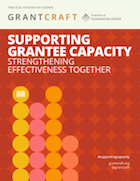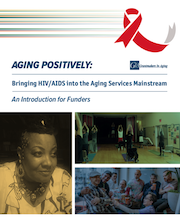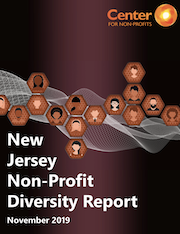Site Search
- resource provided by the Forum Network Knowledgebase.
Search Tip: Search with " " to find exact matches.


In Supporting Grantee Capacity: Strengthening Effectiveness Together, GrantCraft looks at how funders approach building capacity with grantees. Through examples from foundations ranging in size, mission, and geography, we explore various strategies for capacity building and the types of awareness that funders can choose to incorporate in decision making to facilitate informed, thoughtful judgments about strengthening organizations.
After a recommendation from the Racial Equity Task Force, now the Racial Equity Committee of CNJG’s board, the CNJG Board of Trustees approved and adopted the New Jersey Principles for Philanthropy, our equity principles. These Principles are a complete overhaul of CNJG’s Guiding Beliefs & Principles for New Jersey Grantmakers last revised in 2007. No longer a binary option, these Principles use a developmental framework and understand that each organization – and individual in philanthropy - has its own starting point and journey. In 2025, CNJG will gather tools and resources to help members, other philanthropic organizations, and individuals on their own equity journeys. Wherever you see your organization on the spectrum of learning, these New Jersey Principles for Philanthropy offer an opportunity for shared learning and evolving, leadership, and trusting relationships among funders and with your nonprofit partners.
CNJG’s membership is comprised of many varieties of philanthropic organizations, including, but limited to private foundations, public charities, corporate giving programs and foundations, family foundations, government agencies, and more. Each organization will interact with these principles in their own way. Furthermore, staff, board, volunteers, and donors of the organizations will start and journey through the different developmental levels in their own way.
Although we are not requiring CNJG members to “sign onto” these Principles, we do hope that the New Jersey Principles for Philanthropy become a framework and a tool for your organizational development.
CNJG gratefully acknowledges the Minnesota Council on Foundations for laying the groundwork for these New Jersey Principles for Philanthropy.
In this webinar presented by Grantmakers Concerned with Immigrants and Refugees, funders will learn from experts on the ground about their efforts to champion universal representation and how philanthropy can resource and support their work.
Universal Representation–as a principle and policy objective–ensures that every person, regardless of immigration status, has access to due process. Having access to legal representation makes a sizeable difference in an individual’s case. For example, asylum seekers are five times more likely to win their case for asylum if they have legal counsel. Yet there continue to be systemic inequities, with upwards of 70% of immigration cases lacking legal representation.
Not having an attorney has also been shown to have significant negative effects on the health and well-being of immigrants and their families. Areas of impact can include loss of income, degradation of mental health, and loss of access to medical care. Although having legal representation does not guarantee the outcome of a case, it can reduce harm and ensure that the dignity of individuals is protected.
Across the nation, organizations at the local and state levels are using a variety of tools and approaches to advance the goal of universal representation. In this webinar, funders will learn from experts on the ground about their efforts to champion universal representation and how philanthropy can resource and support their work.
COST: Free for CNJG Members and Non Member Grantmakers

The New Jersey State Council on the Arts yesterday awarded more than $30 million in grants to support approximately 900 arts organizations, projects, and artists throughout the state. The grants were approved at the Council's 58th Annual Meeting in Trenton, which featured a special musical performance by Hector Morales, a 2024 Arts Council Heritage Fellow.
State funding for the Arts Council comes from the revenue generated through the State’s Hotel/Motel Occupancy Fee, and supports arts activity in all 21 counties. From the smallest neighborhoods to the largest cities, artists and arts organizations strengthen communities and offer solutions for complex issues we all care about – quality education, health and wellness, thriving economies, cross-cultural understanding, and more.
“The investment made in our state’s artists and organizations has a direct, positive impact on New Jersey residents, families, businesses, and communities,” said Acting Governor Tahesha Way, who oversees the Council in her role as Secretary of State. “It’s an honor to work closely with the Council to help our state’s creative industries thrive, and to ensure New Jersey’s diverse constituencies can access the many benefits of the arts.”

